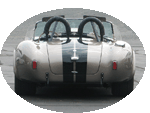 
 Main Menu
Main Menu
|
 Nevada Classics
Nevada Classics
|
 Advertise at CC
Advertise at CC
|
 January 2026
January 2026
|
| S |
M |
T |
W |
T |
F |
S |
| |
|
|
|
1 |
2 |
3 |
| 4 |
5 |
6 |
7 |
8 |
9 |
10 |
| 11 |
12 |
13 |
14 |
15 |
16 |
17 |
| 18 |
19 |
20 |
21 |
22 |
23 |
24 |
| 25 |
26 |
27 |
28 |
29 |
30 |
31 |
|
 CC Advertisers
CC Advertisers
|
|

07-19-2010, 05:57 PM
|
|
CC Member

|
|
|
Join Date: Feb 2008
Location: Jacksonville,
FL
Cobra Make, Engine: Kirkham #570 w Shelby FE
Posts: 1,009
|
|

 Not Ranked
Not Ranked
One thought did occur to me, have the cap pressure tested.
Cylinder heads been re-torqued lately? (do the free stuff first) 
All else fails maybe switch to a waterless coolant, this way you could run a 0psi coolant system.
Reason I mentioned the rear ports is it's an ideal place for steam to collect with no coolant flow to wash it away.
I feel for you on this one, the cause ain't exactly jumpin out at ya.  |
-
Advertising


07-19-2010, 06:08 PM
|
|
CC Member

|
|
|
Join Date: May 2006
Location: St. Louisville,
Oh
Cobra Make, Engine: A&C 67 427 cobra SB
Posts: 2,445
|
|

 Not Ranked
Not Ranked
Undy, do not underestimate the dangers of nitrogen. It kills people every year. I think more than any other gas in industry. It is not the nitrogen that kills you. It is the absence of oxygen. I said one lung full and your dead. It takes about a half dozen breaths to replace what is in your lungs. Loss of conciseness occurs at about 3 breaths with little to no warning.
Don't use it in a closet obviously. Open areas with moving air are safe unless the volume is high. We have excess flow valves that shut the line if the flow exceeds a maximum. Regulator can fail and dump a bottle quickly.
|

07-19-2010, 06:59 PM
|
 |
CC Member

|
|
|
Join Date: Jul 2005
Location: Virginia Beach, Va & Port Charlotte, Fl.,
Posts: 2,292
|
|

 Not Ranked
Not Ranked

Quote:
Originally Posted by olddog

Undy, do not underestimate the dangers of nitrogen. It kills people every year. I think more than any other gas in industry. It is not the nitrogen that kills you. It is the absence of oxygen. I said one lung full and your dead. It takes about a half dozen breaths to replace what is in your lungs. Loss of conciseness occurs at about 3 breaths with little to no warning.
Don't use it in a closet obviously. Open areas with moving air are safe unless the volume is high. We have excess flow valves that shut the line if the flow exceeds a maximum. Regulator can fail and dump a bottle quickly.
|
I'm not worried about the Nitrogen as it couldn't get past all the Phosgene, hydrogen sulfide, refrigerants and carbon monoxide that already fills my lungs...  
I remember to old days I used to do refrigeration "York System flushes" on Navy ships. We'd go into confined spaces and get hit with a loss of oxygen as leaking refrigerants displaced the air in the room (refer equipment decks). We were told to stay down till just before death (seriously) and use the last drop of energy to climb out before loss of consiouness overtook us.. We did it and thought nothing of it at the time. Oh the sins of our youth...
Quote:
Originally Posted by Excaliber

...being one of the resident internet expert's I thought I better get in on this thread as well. 
Don't have a clue, you've covered the bases nicely.
I did like Rick's idea of under water testing for bubbles, I've had good luck with that finding very small leaks in tires. I don't currently have any freon or gas type leak detection tools, so a water bath would have to do for me.
Taste of glycol is a key element in this exercise, very telling.
On removing the heads: Head bolts no problem, HEADER bolts are a PITA however! |
I think we all have a little internet expert in us, like it or not. 
I just talked to Keith and he suggests going forward with pressure testing the rest of the motor. He said he pressure tests all Pond blocks prior to assembly and machining. That gave me a bit of a warm fuzzy. He really didn't have any revelations other than what's been dicussed here already.
Quote:
Originally Posted by ERA Chas

Dave,
Just grasping again but this thought occurred:
A. Started after the intake change-right?
B. Goo only in VC's-right?
Guessing that water is entraining into the oil feed at the rocker pedestals in each head. That would contaminate only the valve cover area. Don't know where such water could come from and don't know why the goo doesn't go down the corner head drains and contaminate the valley/crankcase areas. You don't oil through the pushrods right?
Just trying to get someone smarter than me to think away from all the gasket/head/porosity/testing stuff beat to death here. You've covered all that in my view.
If you haven't already-get KC to listen and offer a thought or two. I KNOW he's not responsible for this problem.
Getting a headache  . |
A= yes
B= yes
Sad to say, not sure on the pushrod oiling, it's a hydraulic roller, Ersons and Smith Bros pushrods..
I feel your pain, I've had a headache too ( might be from tasting all that Glycol and repeatedly huffing Nitrogen) 
Quote:
Originally Posted by Ronbo

One thought did occur to me, have the cap pressure tested.
Cylinder heads been re-torqued lately? (do the free stuff first) 
All else fails maybe switch to a waterless coolant, this way you could run a 0psi coolant system.
Reason I mentioned the rear ports is it's an ideal place for steam to collect with no coolant flow to wash it away.
I feel for you on this one, the cause ain't exactly jumpin out at ya.  |
The cap seems to be working OK although I've not pressure tested it.
I've stayed away from the waterless coolant (Evans etc) as it doesn't have near the heat rejection capability of water/glycol. I don't feel I have enough redundancy in my cooling system to give up any capacity. I did look into it a year or so ago.
I'll look more at those rear ports in the second round this weekend.
The saga continues...
__________________
Too many toys?? never!
|

07-19-2010, 07:27 PM
|
|
CC Member

|
|
|
Join Date: Oct 2003
Posts: 4,078
|
|

 Not Ranked
Not Ranked
Quote:
Originally Posted by undy

Sad to say, not sure on the pushrod oiling, it's a hydraulic roller, Ersons and Smith Bros pushrods..
|
FYI, Ersons oil in the conventional way, not through the p'rods. Any thought about my water- to- rocker- oil feed theory?
__________________
Chas.
|

07-19-2010, 07:39 PM
|
|
CC Member

|
|
|
Join Date: Jun 2005
Cobra Make, Engine:
Posts: 3,077
|
|

 Not Ranked
Not Ranked
You must be a lucky person in life, play the lottery. A company I had worked for buried two people in 8 years. One for nitrogen afixation and the other when an access panel blew apart on a reciprocating compressor and impaled upon his head when the high pressure packing leaked and pressurized the dog house to 30 psig. Then again the access panel was only 3/8" cast iron thick not like your heavy wall manifold you pressured to 150 psig.
Testing with a fluid is exponentially safer since fluid is not compressible. Heck if you are feeling confident do a helium test.
|

07-19-2010, 08:00 PM
|
|
CC Member

|
|
|
Join Date: May 2006
Location: St. Louisville,
Oh
Cobra Make, Engine: A&C 67 427 cobra SB
Posts: 2,445
|
|

 Not Ranked
Not Ranked
I like Rick L proposal of putting the intake in a tank of water. Drop the pressure back to 25 psi so your block off plate gaskets do not leak. Then watch for a bubble. Stare at it a good while.
You were keeping a constant pressure from the bottle and I think I read you were using some type of sniffer. Maybe I'm confusing the freon thing, but I didn't understand your method of looking for the leak. I would think blocking the gas in and watching for the pressure to drop off would be more of a standard test. I guess I'm not certain that your test was absolutely conclusive. Maybe it was and I just lack the understanding.
|

07-19-2010, 10:45 PM
|
|
Senior Club Cobra Member

|
|
|
Join Date: Jul 2002
Cobra Make, Engine:
Posts: 15,712
|
|

 Not Ranked
Not Ranked
I to have worked in HVAC for many years, chillers to window units, even did a morgue for body storage once.  A freeze drier application was interesting, that was some very exoctic and expensive gas for that unit! I never worked with ammonia, now THAT stuff is dangerous.
Freon, nitrogen, other gases, just part of the hazard. I am reminded of a news story about a fellow that filled his air mattress with freon, he never woke up... |

07-20-2010, 04:47 AM
|
 |
CC Member

|
|
|
Join Date: Jul 2005
Location: Virginia Beach, Va & Port Charlotte, Fl.,
Posts: 2,292
|
|

 Not Ranked
Not Ranked

Quote:
Originally Posted by ERA Chas

FYI, Ersons oil in the conventional way, not through the p'rods. Any thought about my water- to- rocker- oil feed theory? |
I'll pressurize the right and left banks of the engine separately. I'll probably use some R-410A for a reference additive and back it with nitrogen. I'll run my electronic leak detector around. It's sensitive enough to pick up 1/2 an ounce of refrigerant leakage a year. If there's a leak in the rocker oil feed circuit it will pick it up.
Quote:
Originally Posted by olddog

I like Rick L proposal of putting the intake in a tank of water. Drop the pressure back to 25 psi so your block off plate gaskets do not leak. Then watch for a bubble. Stare at it a good while.
You were keeping a constant pressure from the bottle and I think I read you were using some type of sniffer. Maybe I'm confusing the Freon thing, but I didn't understand your method of looking for the leak. I would think blocking the gas in and watching for the pressure to drop off would be more of a standard test. I guess I'm not certain that your test was absolutely conclusive. Maybe it was and I just lack the understanding.
|
The entire portion of the manifold that could leak water into the oil is fully visible. I use a purpose manufactured high viscosity soap suds solution with excellent designed cling characteristics to coat all the potential leaking surface areas. It's just as good as submersion and a heck of a lot less messy. watching a bleed-down test really is not as good as a visual inspection of said areas. The bleed-down method is great when all the areas aren't visible, like an assembled engine's entire cooling system. Initially I'll probably use the bleed-down method when I pressurize the halves of the engine. If it shows results I'll start looking for specifics.
Quote:
Originally Posted by Excaliber

I to have worked in HVAC for many years, chillers to window units, even did a morgue for body storage once.  A freeze drier application was interesting, that was some very exotic and expensive gas for that unit! I never worked with ammonia, now THAT stuff is dangerous.
Freon, nitrogen, other gases, just part of the hazard. I am reminded of a news story about a fellow that filled his air mattress with Freon, he never woke up... |
Hey Ernie, always great to find a fellow "Freon Sniffer". The HVAC hustle has been good to me in life, allowing for some of the finer (and not so finer) things. I've work some ammonia too, as you said it some nasty stuff.
Actually, my oncologist sort of hinted that my CLL (Chronic Lymphotic Leukemia) is frequently caused by handling and inhaling potentially carcinogenic chemicals and gases.. Go figure.
__________________
Too many toys?? never!
|

07-20-2010, 07:32 AM
|
|
CC Member

|
|
|
Join Date: May 2008
Location: Sacramento,Ca.,
Ca.
Cobra Make, Engine: Midstates (2001)
Posts: 1,724
|
|

 Not Ranked
Not Ranked
I to had this similar problem......the rear intake bolt had lost torque and allowed the rear of the intake manifold to lift and cause a leak of antifreeze into the oil.....my oil looked like a milkshake but as you said in your case it only shows on the inside of the rocker covers.......if the leak is that minute it will be very hard to detect.....i say what Patrick said......put the other manifold back on and run it and see what happens....and if i paid some hard earned cash for a new block and manifold and they leaked...someone would be getting them shoved up the their tailpipe.....isnt that why you buy new stuff so you dont have problems like this..... |

07-20-2010, 09:50 AM
|
|
Senior Club Cobra Member

|
|
|
Join Date: Jul 2002
Cobra Make, Engine:
Posts: 15,712
|
|

 Not Ranked
Not Ranked
New stuff has a gaurentee?  I often prefer "road tested" used parts over new. To many times new stuff is just as much suspect as used stuff. Just cause you have a "warranty" that doesn't remove the BIG hassle replacing or getting the part to work.
Gimme road tested parts in many cases!! |

07-20-2010, 10:33 AM
|
 |
CC Member

|
|
|
Join Date: Aug 2009
Location: Edinburg,
TX
Cobra Make, Engine: Everett Morrison, All aluminum small block ford.
Posts: 436
|
|

 Not Ranked
Not Ranked
I agree with Excaliber... new means it hasnt been tested. Back in the day when I was doing refrigeration for a living..We installed a "brand new" 7 ton condensing unit on a c-store. Plumbed it in, pulled a vaccum, leak checked fired it up and started charing. Roughly 18 lbs of R22 to fill the big system. Watching the sight glass, got it almost full and the compressor went RRRRRRRRRRrrrrrrGGGGGGrrrrrrtTTTTTT and the sight glass turned black. Long story short we went through 3 "brand new" compressors before we got one that would run for more than 30 minutes. Sure they had warranty...that warranty didnt pay me for my labor of flushing the lines..replacing the expansion valve, drier,suction strainer etc etc etc...Undy knows what Im talking about.
I still think its a head gasket myself.
__________________
" If it wont break em loose in 3rd gear, it aint enough power "
|

07-20-2010, 11:03 AM
|
 |
CC Member

|
|
|
Join Date: Jul 2005
Location: Virginia Beach, Va & Port Charlotte, Fl.,
Posts: 2,292
|
|

 Not Ranked
Not Ranked
Quote:
Originally Posted by Excaliber

New stuff has a gaurentee?  I often prefer "road tested" used parts over new. To many times new stuff is just as much suspect as used stuff. Just cause you have a "warranty" that doesn't remove the BIG hassle replacing or getting the part to work.
Gimme road tested parts in many cases!! |
Especially if you're running Dove parts...   
__________________
Too many toys?? never!
|

07-20-2010, 11:05 AM
|
 |
Half-Ass Member

|
|
|
Join Date: Jun 2005
Cobra Make, Engine: ERA #732, 428FE (447 CID), TKO600, Solid Flat Tappet Cam, Tons of Aluminum
Posts: 22,025
|
|

 Not Ranked
Not Ranked
Quote:
Originally Posted by undy

|
If a pressure testing of the block and heads show no abnormalities, will you reconsider swapping the BT back in? |

07-20-2010, 11:07 AM
|
 |
CC Member

|
|
|
Join Date: Jan 2008
Location: Sacramento, CA,
Posts: 636
|
|

 Not Ranked
Not Ranked
Quote:
Originally Posted by Excaliber

I to have worked in HVAC for many years, chillers to window units, even did a morgue for body storage once.  A freeze drier application was interesting, that was some very exoctic and expensive gas for that unit! I never worked with ammonia, now THAT stuff is dangerous.
Freon, nitrogen, other gases, just part of the hazard. I am reminded of a news story about a fellow that filled his air mattress with freon, he never woke up... |
I would like to hear the rest of the story... I didnt think freon was toxic (maybe to the ozone... ) did it absorb into his skin? |

07-20-2010, 11:25 AM
|
 |
CC Member

|
|
|
Join Date: Jul 2005
Location: Virginia Beach, Va & Port Charlotte, Fl.,
Posts: 2,292
|
|

 Not Ranked
Not Ranked
Quote:
Originally Posted by patrickt

If a pressure testing of the block and heads show no abnormalities, will you reconsider swapping the BT back in?
|
I had more problems with Blue Blunder manifolds than I have with the Dove stuff. Furthermore, Art w/ BT is a great big A$$HOLE.  Ask me how I feel about him/them! It's a big ugly story, with Dennis Carrico (DSC) as a main evil character too.
That should answer that one Pat. 
Really, I'm sending off the TW for the impregnation today. BT doesn't really make anything that trips my trigger as far as manifolds anyway.
__________________
Too many toys?? never!
|

07-20-2010, 11:28 AM
|
 |
Half-Ass Member

|
|
|
Join Date: Jun 2005
Cobra Make, Engine: ERA #732, 428FE (447 CID), TKO600, Solid Flat Tappet Cam, Tons of Aluminum
Posts: 22,025
|
|

 Not Ranked
Not Ranked
Quote:
Originally Posted by undy

That should answer that one Pat.  |
Uhhh, yes indeed.  I won't ask again.  |

07-20-2010, 11:30 AM
|
 |
CC Member

|
|
|
Join Date: Jul 2005
Location: Virginia Beach, Va & Port Charlotte, Fl.,
Posts: 2,292
|
|

 Not Ranked
Not Ranked

Quote:
Originally Posted by Z-linkCobra

I agree with Excaliber... new means it hasnt been tested. Back in the day when I was doing refrigeration for a living..We installed a "brand new" 7 ton condensing unit on a c-store. Plumbed it in, pulled a vaccum, leak checked fired it up and started charing. Roughly 18 lbs of R22 to fill the big system. Watching the sight glass, got it almost full and the compressor went RRRRRRRRRRrrrrrrGGGGGGrrrrrrtTTTTTT and the sight glass turned black. Long story short we went through 3 "brand new" compressors before we got one that would run for more than 30 minutes. Sure they had warranty...that warranty didnt pay me for my labor of flushing the lines..replacing the expansion valve, drier,suction strainer etc etc etc...Undy knows what Im talking about.
I still think its a head gasket myself.
|
Yep, been there, done that! I wish the HVAC industry was like the automotive industry. Most of the HVAC MFRs DO NOT pay labor and consumables under warranty, just equipment parts. You end up eating it for a year if there's problems.
You may be right on the head gasket.
__________________
Too many toys?? never!
|

07-20-2010, 11:32 AM
|
 |
CC Member

|
|
|
Join Date: Jul 2005
Location: Virginia Beach, Va & Port Charlotte, Fl.,
Posts: 2,292
|
|

 Not Ranked
Not Ranked
Quote:
Originally Posted by patrickt

Uhhh, yes indeed.  I won't ask again.  |
The BT 427MR 1x4 manifold I got from DSC had a dizzy hole that was 1/4" out, that's 0.250". DSC told me to pack sand and Art blantantly called me a liar. I fixed it myself.
__________________
Too many toys?? never!
|

07-20-2010, 04:22 PM
|
|
CC Member

|
|
|
Join Date: May 2006
Location: St. Louisville,
Oh
Cobra Make, Engine: A&C 67 427 cobra SB
Posts: 2,445
|
|

 Not Ranked
Not Ranked

Quote:
Originally Posted by undy

The entire portion of the manifold that could leak water into the oil is fully visible. I use a purpose manufactured high viscosity soap suds solution with excellent designed cling characteristics to coat all the potential leaking surface areas. It's just as good as submersion and a heck of a lot less messy. watching a bleed-down test really is not as good as a visual inspection of said areas. The bleed-down method is great when all the areas aren't visible, like an assembled engine's entire cooling system. Initially I'll probably use the bleed-down method when I pressurize the halves of the engine. If it shows results I'll start looking for specifics.
|
I must have got confused somewhere earlier. Yes soap is a great test. Obviously you know all about leak tests in your line of work. You don't need me to tell you that.
OK it sounds like the intake is totally ruled out, and the intake gaskets maybe not totally but very low probability. I agree the next step is pressure test the block and heads together and go from there.
One question on picture #1. The block deck seems to not be solid where the intake and heads mate up. Is that a drain path to the pan or what?

|

07-20-2010, 05:31 PM
|
|
CC Member

|
|
|
Join Date: Oct 2003
Posts: 4,078
|
|

 Not Ranked
Not Ranked
Quote:
Originally Posted by olddog

I
One question on picture #1. The block deck seems to not be solid where the intake and heads mate up. Is that a drain path to the pan or what?
|
That's the head gaskets.
__________________
Chas.
|
 Posting Rules
Posting Rules
|
You may not post new threads
You may not post replies
You may not post attachments
You may not edit your posts
HTML code is Off
|
|
|
All times are GMT -7. The time now is 10:18 AM.
|
























 .
.
 Linear Mode
Linear Mode



